7 June 2018. Brussels. Side event European Development Days. The EC together with ECOWAS and WAEMU organised the High level conference on job creation, growth and competitiveness in West Africa.
Focusing on 3 areas – MSMEs, agribusiness and digitalization - the conference brought together high-level policy makers from the EU and West Africa, financial institutions and the private sector.
Extracts of the programme:
Welcome and Keynote speeches
Focusing on 3 areas – MSMEs, agribusiness and digitalization - the conference brought together high-level policy makers from the EU and West Africa, financial institutions and the private sector.
Extracts of the programme:
Welcome and Keynote speeches
- Introduced by Ibrahima Cheick DIONG, Chief Moderator of the HighLevel Conference on Jobs andGrowth in West Africa; Founder and Chief Executive Officer, Africa Consulting and Trading
- Neven MIMICA, Member of the EC in charge of International Cooperation and Development
- Jean-Claude BROU, President, ECOWAS Commission - Abdallah BOUREIMA, President, UEMOA Commission
- Livestream: http://europa.eu/!NB44rW
- Starting @ 05:53:41
With over 60% of the labour force in the sector, generating around 30% of GDP, agriculture has an immense potential to generate wealth and alleviate poverty in West Africa. Whilst it is agreed that
both public and private investment is necessary to unlock the potential of agribusiness, the sector is still perceived as risky and access to affordable finance remains a challenge throughout the value chain. A strategic approach, blending development funds with private capital, is needed to promote productivity of priority agri-food chains and enable value-added processing of agricultural produce.
both public and private investment is necessary to unlock the potential of agribusiness, the sector is still perceived as risky and access to affordable finance remains a challenge throughout the value chain. A strategic approach, blending development funds with private capital, is needed to promote productivity of priority agri-food chains and enable value-added processing of agricultural produce.
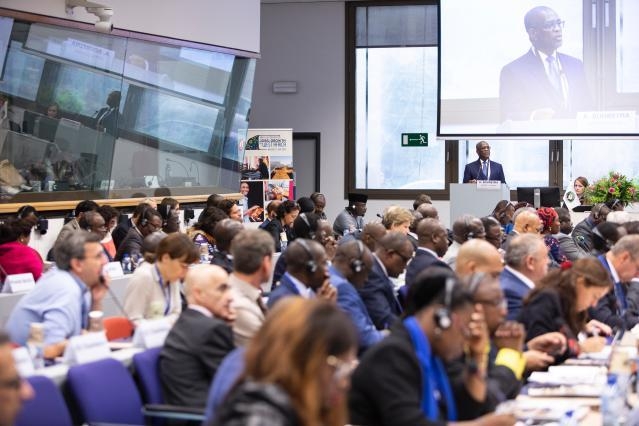 This session focused on the collaborative action needed to increase competitiveness and sustainability throughout priority agri-food chains to create attractive and profitable jobs in West Africa, drawing on lessons learnt from existing initiatives.
This session focused on the collaborative action needed to increase competitiveness and sustainability throughout priority agri-food chains to create attractive and profitable jobs in West Africa, drawing on lessons learnt from existing initiatives.
Topics addressed included:
- Which agri-food chains should be prioritised due to their potential impact for job creation and competitive advantage in West Africa, and how can more value-added transformation be incentivised in West Africa along these commodities?
- What are the most critical policy and regulatory changes that must take place to create a businessenabling environment in West Africa, and how can strategic partners support this?
- How can West African agribusinesses access innovative financing mechanisms to scale up their operations?
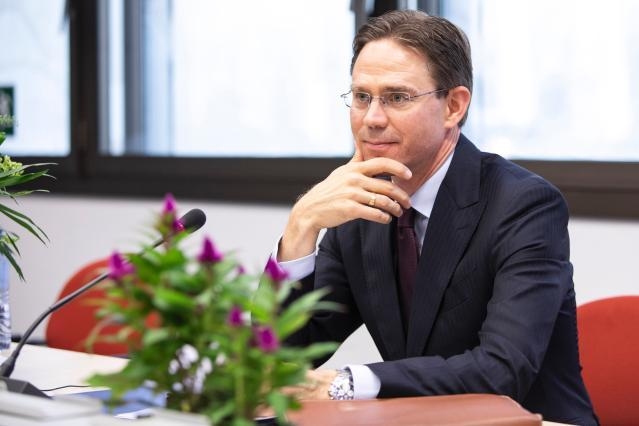 The Investment Plan for Europe has successfully raised financing for innovative projects and SMEs in Europe, making a significant impact in creating jobs and improving competitiveness. Europe is committed to partnering with Africa to apply the same principles through the External Investment Plan.
The Investment Plan for Europe has successfully raised financing for innovative projects and SMEs in Europe, making a significant impact in creating jobs and improving competitiveness. Europe is committed to partnering with Africa to apply the same principles through the External Investment Plan.
Speakers:
- JYRKI KATAINEN (see picture) Vice-President for Jobs, Growth, Investment and Competitiveness, European Commission
- PHIL HOGAN (video message) Commissioner for Agriculture and Rural Development, European Commission
- BAUDOUIN MICHEL Professor and Director, École Régionale Post-Universitaire d’Aménagement et de Gestion Intégrés des Forêts Tropicales, University of Kinshasa
- JONAS GBIAN Commissioner for Food Security and Agriculture, Mining and the Environment, UEMOA Commission
- JERZY PLEWA Director General for Agriculture and Rural Development, European Commission
- CATHERINE KROBO-EDUSEI (see picture) Founder and Director, Eden Tree, GhanaCatherine Krobo Edusei founded Eden Tree when she returned to Ghana after working in the banking industry in the UK for 7 years. Eden Tree buys fresh fruits and vegetables to local smallholders and sells them to Ghanaian supermarkets and hypermarkets, which are more and more numerous. This combative business model contributed, at her scale, to the develop of her country: her company has created dozens of jobs in five years; it sustains hundreds of local farmers; it saves thousands of hours to its customers, allowing them to spend less time on their shopping and cooking. One of her goal was also to improve access to healthy food for local population.
- ROMUALD WADAGNI Minister of Economy and Finance, Benin
- JEAN-PIERRE MARCELLI Africa Director, French Development Agency
- RITA WEIDINGER Executive Director, Competitive Cashew Initiative
Related:
The Sustainable Business for Africa (SB4A) is a platform for structured dialogue with the private sector under the EIP at country, sector and strategic levels.
- SB4A helps to identify and prioritise necessary investment climate reforms and attract private investment in partner countries in order to create decent jobs, sustainable growth, and reduce poverty, with a focus on women and youth.
- It was launched at the EU-Africa Business Forum in Abidjan in November 2017.
- SB4A includes sector/thematic dialogues on agriculture, renewable energy, digitalisation or support to Micro, Small and Medium Sized Enterprises (MSMEs); other sectors could be added. At the local level, it involves the EU and African private sector (profit and non-profit actors), and is facilitated by EU Delegations and EU business groups.
The European Commission is launching sectoral structured dialogue with the private
sector platforms between Europe and Africa, on the three sectors:
- digital,
- sustainable energy and
- agribusiness
The EU-Africa Agribusiness
Platform
Building on the Agri-business
Investment Forum and the
EU-AU Agriculture Ministerial
Conference of 1st and 2nd July
2017, the AU-EU Agribusiness
platform will involve
both public and private partners
from Africa and Europe.
It will provide a better understanding
and improvement
of the investment climate
and aims at scaling-up cooperation
between African and
EU businesses and consider
how to build an AU-EU Agricultural
Business Platform.
The value chain approach is increasingly being used and is expected to support employment creation for all, including youth, in a sustainable manner. In 2016, the EC launched the Value Chain Analysis for Development (VCA4D) project, implemented in partnership with AGRINATURA, the European Alliance on Agricultural Knowledge for Development.
- The objective of the VCA4D is to assess the performance and contribution of selected agricultural commodities to growth and job creation in a range of countries, taking into account the economic, social and environmental sustainability and inclusiveness of these value chains. The analysis looks at the number of jobs taken by men and women along a value chain and sometimes includes information on youth, though not in a systematic way.
- The VCA4D project has been implemented in Mali (rice), Burkina Faso (mango), Kenya (green beans) and Cote d’Ivoire (cassava). The selection of value chains takes into account performance aspects as well as government priorities.
Study n°
|
Country
|
Value Chain
|
Timing
|
Comments
|
1
|
Rice
|
Oct 2015 - Feb 2016
|
Completed
| |
| 2 | Burkina Faso | Mango | Feb 2016 - Nov 2016 |
Completed
|
| 3 | Kenya | Green Beans | Mar 2016 - Nov 2016 |
Completed
|
| 4 | Cassava | Mar 2016 - Nov 2016 |
Completed
| |
| 5 | Honduras | Coffee | June 2017 - April 2018 | Completed |
| 6 | Zambia | Egg | April 2017 - April 2018 | Completed |

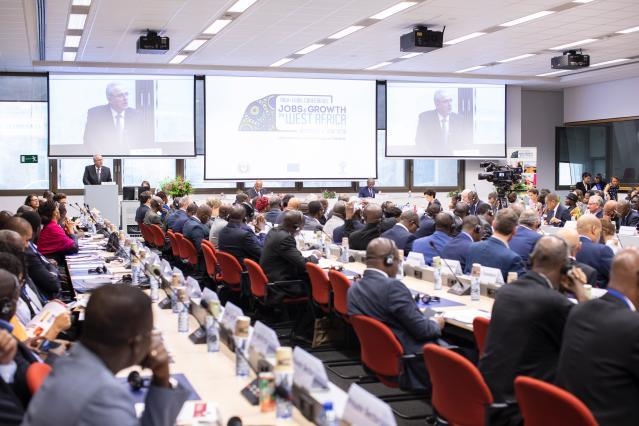
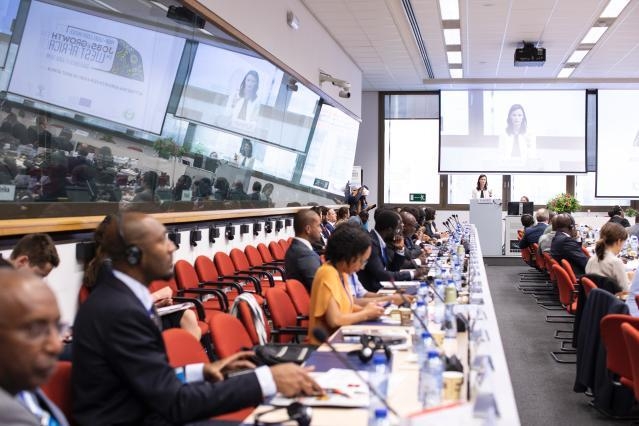
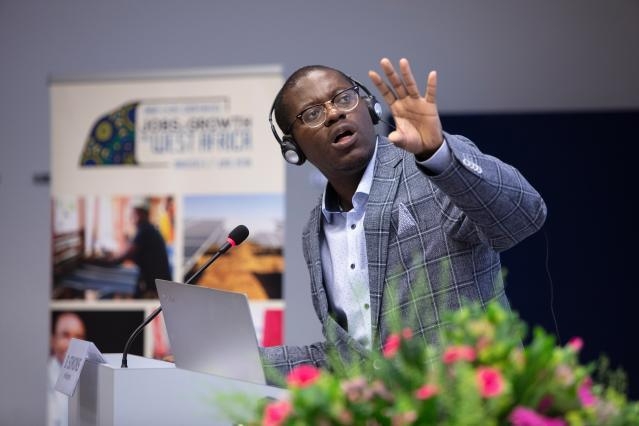


No comments:
Post a Comment